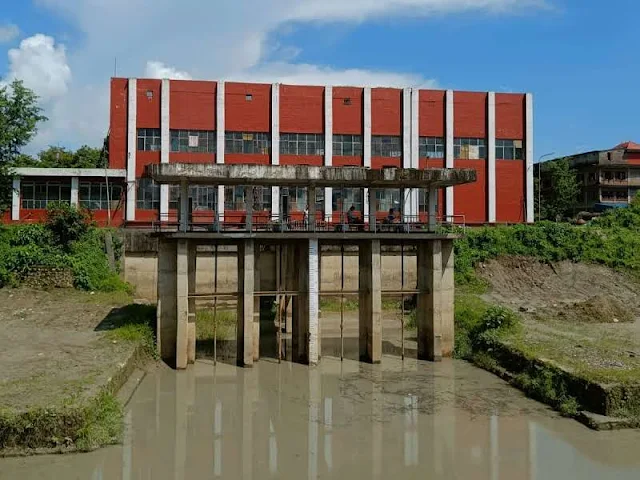सिंचाई क्षेत्रमा कृषि इन्जिनियरको भूमिका
पृष्ठभूमि :
कृषि मानव जीवनलाई निरन्तरता दिने अहम पेशा हो भने सिंचाई कृषिलाई निरन्तरता दिने प्राणशक्ति दुई तिहाई जनसंख्या कृषि क्षेत्रमा आवद्ध छन् । राज्यको कुल ग्राहस्त उत्पादनमा कृषिक्षेत्र 22 योगदान रहेकोछ । साना उद्योगहरुमा सिभिल, मेकानिकल, इलेक्ट्रीकल, कम्प्युटर जस्ता कार्यमा प्राविधिक साहायताका लागी हरेक विषयका ईन्जिनियर आर्थिक हिसाबले धान्न सकिदैन् । कृषि इन्जिनियरलाई विविध क्षेत्रको ज्ञान दिएर क्षमता विकासमा तालिम दिएको हुन्छ तसर्थ विभिन्न क्षेत्रहरूमा कृषि इन्जिनियरको प्राविधिक क्षमत हुने भएकोले कृषि इन्जिनियरहरु त्यस्ता क्षेत्रमा उपयुक्त हुन सक्दछ । कृषि इन्जिनियरले ग्रामीण इन्जिनियरको भूमिका निर्वाह गर्न सक्छ, जसले स्थानीय स्तरमा गरिने सम्पूर्ण कार्यको कुशलतापूर्वक सम्पन्न गर्ने क्षमता राख्दछ । देशको एक मात्र कृषि इन्जिनियरिङ्ग विषयमा अध्ययन भईरहेको पूर्वान्चल क्याम्पस धरानबाट वर्षेनी ४८ जना कृषि इन्जिनियर उत्पादन हुन्छ । कृषि इन्जिनियरलाई ग्रामीण, सिंचाई, कृषि, जल उत्पन्न तथा प्रकोप व्यवस्थापन, भुमिगत जनस्रोत, कृषि अनुसन्धान, बैकल्पीक ऊर्जा, विज्ञान तथा प्रविधि मौसम पुर्वानुमान जस्ता क्षेत्रमा कुशलता पुर्वक कार्य सम्पादन गर्दै आएको अवस्था छ । यसर्थ कृषि इन्जिनियरहरुलाई राज्यको सामाजिक तथा आर्थिक परिवर्तनको लागी परिचालन गर्न सकिन्छ ।
विगतको सिंचाई क्षेत्रमा कृषि इन्जिनियरहरुले योगदान दिईरहेको र २०७५ साल अगाडी सम्म ऊर्जा जलस्रोत तथा सिचाई मन्त्रालय अन्तरगतको प्रत्येक विकास डिभिजनहरुमा दरबन्दी कायम रहेको र आफ्नो कार्य सम्पादन अति उक्तम तरिकाले समापन गरेको पाईएको छ । कृषि इन्जिनियरनमा विविध विषयहरु पाठ्यक्रममा छन् जसमध्ये केही महत्वपूर्ण विषय जसको अध्ययनबाट कृषि र सिंचाइलाई प्रगतिसिल ढंगमा लान सकिन्छ जुन तलको अनुसुचीमा राखिएको छ ।
सिंचाई क्षेत्रमा मा कृषि इन्जिनियर किन ?? :
नेपाल भौगोलिक रुपमा तिन भागमा विभाजित छ जसमा हिमाल, पहाड र तराई र सो क्षेत्रको सिंचाई कार्यक्रम लागु गर्दा त्यो क्षेत्रको लागी लगाईने बाली, Crop Calender Cropping Pattern अनुसार त्यस बालीको लागी चाहिने पानिको परीमाण (Crop Water Requirement) को आधारमा त्यस सिंचाई योजनाको निर्माण तथा संचालन गर्न आवश्यक हुन्छ र त्यसमा कृषि इन्जिनियरको भुमिका प्रमुख रहन्छ ।
सिंचाई योजनाको प्रतिफल सिंचाई संरचनाको टिकाउ तथा कृषि उत्पादकत्व बाट मात्र लिन "सकिन्छ र सिंचित क्षेत्रको बाली उत्पादकत्व, पानी (समय र मात्रा), मल र माटो संग मुख्य रुपमा सम्बन्धीत रहेको हुन्छ जुन कुराको ज्ञान कृषि इन्जिनियर संग मात्र हुने भएकोले कृषि ईन्जिनियरको सिचाइ विकास गर्नमा महत्वपूर्ण भुमिका हुन्छ ।
नेपाल सरकार प्रदेश सरकार द्वारा संचालित सतह सिंचाई, भूमिगत सिंचाई, नया प्रविधि Lift Irrigation, Drip Irrigation, Sprinkler Irrigation मा आधारित सिंचाई योजना कार्यान्वयनको क्रममा छन् त्यस क्षेत्रमा कृषि इन्जिनियरहरुले गुणस्तरीय तथा उत्तमः तरिकाले कम लागतमा विभिन्न आधुनिक प्रविधि प्रयोग गरी कृषि उत्पादन तथा उत्पादकत्व वृद्धि गर्नका लागि महत्वपूर्ण भूमिका निर्वाह गर्न सक्छन् ।
विश्वव्यापि रूपमा Global Warming को प्रभाव पर्दै गएको र नेपालमा पनि यसको प्रभाव देखिन थालेको हुँदा सिचाइका स्रोत संरक्षण, भुक्षय नियन्त्रण, नदि नियन्त्रण, जलाधार संरक्षण, पहिरो नियन्त्रण, कृषि बाति व्यवस्थापन जस्ता कार्य गर्नु पर्ने हुदा यस्ता कार्यमा कृषि इन्जिनियरको अहम भूमिका हुन्छ।
सिंचाइ को दिगो विकासको निमित्त सिचाइ प्रणालिको सुद्रिढिकरण जसमा सुधार, पुनस्थापना, आधुनिकिकरण, विस्तार, सिचाइ व्यवस्थापन सूचना प्रणालिको विकास तथा सुधार गरी आवश्यक अनुसन्धान तथा तालिम गराइ ज उस तथा कृषकको संस्थागत विकास मा सहयोग पुर्याउने ।
स्थानिय स्तरमै उपलब्ध सतह तथा भुमिगत जलश्रोत संयोजनात्मक (Conjunctive Use उपभोग गर्ने उद्देश्य सिंचाइ निति २०७० को रहेको हुँदा सो सम्बन्धिको प्राविधिक ज्ञान तथा सिप कृषि इन्जिनियरमा हुने ।
सिंचित क्षेत्रमा जम्मा हुने पानिको समुचित निकास ( Drainage ) को व्यवस्था गर्ने ।
सिंचाइ योजनाकी पहिचान, सर्वेक्षण, डिजाइन, इष्टिमेट तथा निर्माणका लागि आवश्यकता अनुसार सिंचाइ योजना को प्रकार छनौट गरी निर्माण गर्न भुमिका निर्वाह गर्न सक्ने ।
कृषि इञ्जिनियरहरुले संरचना निर्माण गनुको साथै कृषि सम्बन्धी आवश्यक सीप ज्ञान प्रदान गरी समग योजनालाइ सफल गर्न महत्वपूर्ण योगदान दिन सक्छन ।
वर्तमान परिप्रेक्ष्यलाइ हेर्दा बढ्दो सहरीकरण जनसंख्या वृद्धि, खेती योग्य जमिनको उर्वराशक्तिमा कमी साथै कृषि योग्य जमिन गैर कृषि प्रयोजनको लागि प्रयोग भइरहेको परिपाटीले निकट भविष्यमा वाधन्न अभाव हुने स्थिति देखिन्छ । यस कुरालाई मध्यनजर गर्दा यस परिस्थितिलाइ समाधान गर्नको लागि कृषि इन्जिनियरको भूमिका अपरिहार्य देखिन्छ ।
सिचाइ क्षेत्र को विकासमा देखिएका समस्याहरु :
सिंचाइको दिगो विकासका हुन नसक्नु ।
सिंचाइ को संरचनागत विकासले मात्र समग्र सिचाइ क्षेत्रको विकास नभइ उत्त योजनाको समग्र दिगोपन, कृषकमा irrigation Water को अधिकतम उपयोग सम्बन्धिको ज्ञान कुन बालीमा कति पानी को आवश्यकता, पानी को आवश्यकता अनुसार सिचाइ योजनाका Controlled Structure को Callibration जस्ता कार्यले मात्र सिंचाई क्षेत्रको विकास हुन्छ भन्नेको कमी हुनु ।
बर्सेनि करोडौ रकम सिचाइ संरचना निर्माणमा खर्च भएता पनी अपेक्षाकृत कृषि उत्पादन तथा प्रतिफल नहुनु ।
निष्कर्ष:
कृषिलाई व्यवसायी मुखी बनाइ कृर्षकको जिवनस्तर उकासी उनिहरुलाइ सिंचाई प्रणाली प्रति जिम्मेवार तथा जवाफदेहि बनाउन सकेमात्र समग्र सिंचाई क्षेत्रको विकास तथा विस्तार भएको मान्न सकिन्छ । बर्षेनि उत्पादित कृषि इन्जिनियरहरु लाई उनिहरुको प्राविधिक ज्ञान सिप अनुसार सरकार ले प्रयोग गर्ने हो भने सरकारले निर्दिष्ट गरेका लक्षहरुमा पुग्न सकि बहुमुखी प्राविधिक क्षमता भएका कृषि इन्जिनियरहरु को सिप विदेश पलायन हुनबाट रोक्न सकि निश्कर्ष निकाल्न सकिन्छ ।
लेखक: धिरज लम्साल


